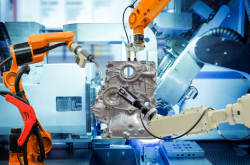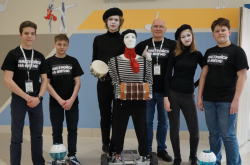Multi-agent systems
Multi-agent systems consist of several interoperating intellectual agents; such agents have several important features. First of all, they are autonomous. Secondly, neither of these agents has full information about the system, or the system is too complex for such information to have any practical meaning to the agent. Lastly, neither of the agents can manage the system on its own.
A multi-agent system’s purpose is to find optimal solutions without external intervention. Another advantage of these systems is their flexibility. It is possible to modify a multi-agent system without needing to rewrite a considerable part of the program. Such systems also have the ability to self-recover and are highly fault-tolerant.
Both humans and robots can be agents of such systems; the agents use a special language and follow particular protocols to exchange their knowledge.
So, how does it work in practice? If we’re talking about information systems, a multi-agent system can be used to update relevant data or software suites used in an production system on all production stages. By integrating themselves into management systems, they can automatically check the availability of the necessary data by working with planned and unexpected processes alike.
 Credit: controlengrussia.com
Credit: controlengrussia.com
Industry 4.0: “smart” plants that work automatically
Still, can a multi-agent system provide for the function of an entire enterprise? Back in 2011, at an industrial exhibition in Hannover, the German government stressed the importance of introducing more information technologies in production. Around the same time, the term Industry 4.0 had started to gain popularity in Europe, and many researchers started to develop concepts of making enterprises “smart”.
Today, the term “Industry 4.0” is used as a synonym of the fourth industrial revolution. Its key point is to create new cyber-physical complexes and unite them in a unified digital ecosystem. In this sense, intellectualization of processes and product life cycles becomes one of the most prioritized fields.
So, how will enterprises change after the introduction of such systems? The development of Industrial Cyber Physical Systems, or ICPS’s, puts the merit of traditional approaches to production management in question. For instance, by following the ICPS concept, companies can offer an individual approach to order personalization per their customers’ preferences. For instance, the Fujitsu Siemens plant in Augsburg can produce small batches of customized computer systems and servers. This being said, the expenses spent on producing customized goods at a properly automated operation are quite low. If before, one would have to manually adjust equipment for every customized product, now this can be done automatically and takes mere seconds.
 Russian-German developer team
Russian-German developer team
ITMO - Hochschule Emden/Leer collaboration
Having created its counterpart to the Silicon Valley, the Intelligent Technical Systems OstWestfalenLippe, Germany is among the world’s leaders in development of Industry 4.0. ITMO’s partner university Hochschule Emden/Leer, too, conducts R&D in this field.
The recent visit of professor Juho Mäkiö to ITMO University gave a start to several projects, including “Smart Mason”, which focuses on modeling different technological processes by using a multi-agent system.
A year ago, several students from the Instrumentation Technologies Department started to collaborate with their German peers on a simplified model of a production shop where robots would interact with not just each other, but any elements of the model. As result, they’ve created both a virtual model and a physical model based on LEGO Mindstorms robots. This September, ITMO students Semyon Mironov, Alexander Ushakov, Maksim Genko and Nikita Gulevich proceeded with this collaboration.
“One has to understand that what we’re working on is a simplified model that has nothing to do with any real operation. We’re not as conceited as to believe that we will create the model, propose it and it will work alright. Although such breakthrough technologies like the Internet of Things, Big Data, cloud computations and the like are already being introduced by leading enterprises, most real business are still far from putting the Industry 4.0 concepts to practice. Oftentimes, the reported achievements in this field are deemed as such for advertising purposes, - many researchers understand and acknowledge this much. Such projects are conducted at university laboratories or by very prosperous companies, as result of successful pilot projects or grants. Process design is most complex in what has to do with Industry 4.0. In reality, such activities will continue being the domain of humans, despite all the existing fantastic ideas. So, for now, we are mostly gaining experience in development of such systems, pilot ideas and approaches, and study the technologies. We believe that we’ll once be able to use all this to set the tasks that have to do with real operations as part of a pilot project. We seek to solve the problems we face in a staged manner. For instance, if last year our objective was to create a model of a production shop, this year we’ve focused on modeling an entire operation, where we have to account for such elements as finance, procurement, sales, etc. This way, we include our previous results into the new system,” shares Aleksander Ushakov.

It took three months to complete the new project; the Russian and German students worked in groups. During the first stage, the students negotiated technical requirements and developed the system’s architecture; then, some of the participants focused on developing the graphic interface while others focused on designing a model to manage the system’s agents: the agent that is responsible for procurement and sales, the financial agent and the production agent that monitors the activity of robots and other agents.
“One can explain how the model works using a computer game as an example. First, we enter data, i.e. an order. Based on this data, the system’s agents begin interacting with each other by initiating negotiation processes. What’s more, we can monitor the process: identify changes in parameters and follow the actions of each agent. On return, we get the results, Further intellectual analysis of the accumulated data can be used in searching for new, “hidden” knowledge that, in turn, can be used for the development of new predictive models. In a sense, our project will help us get a better understanding of modern ICPS technologies and approaches, as well as showcase some of the key concepts of Industry 4.0,” explains Semyon Mironov.
The Russian students have already presented the project’s provisional at Hochschule Emden/Leer. The project’s final presentation is planned for May.
Future prospects
Students plan to further develop their project: according to Semyon Mironov, they are even considering adding a neural network to help solve tasks related to automated development of technological processes.
“Before developing a technological process, one has to work out all operations, transitions and the like. So far, I haven’t heard of any real examples of a program using a product's 3D model to develop a technological process for a CNC machine, and which didn’t require any human help. I guess, in future, we’ll have to use machine learning, approaches based on neural networks and other AI technologies to automate creative processes, including the product’s design and development of technological algorithms and programs for CNC machines,” adds the student.
 At Hochschule EmdenLeer
At Hochschule EmdenLeer
The project is carried out at ITMO’s Instrumentation Technologies Department and the International Laboratory of Nonlinear Adaptive Control Systems. The new system will be used as basis for a series of laboratory courses for joint international Master’s programs.
We’d like to add that collaboration between ITMO and Hochschule Emden/Leer isn’t limited to just this project. Apart from short-term internships, students of both universities have the opportunity to spend a full semester at the corresponding partner university.





